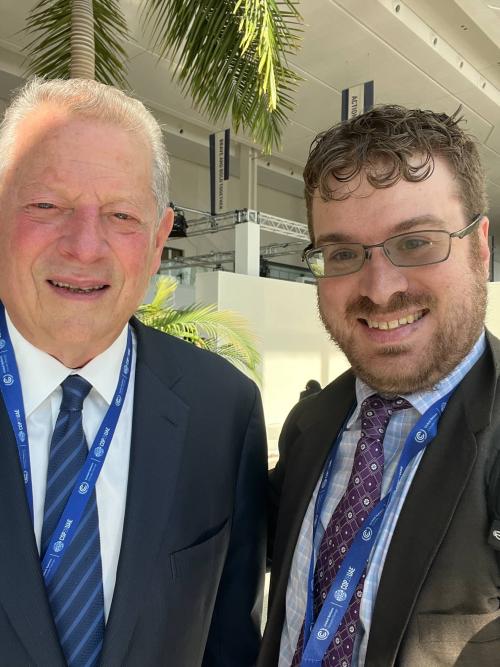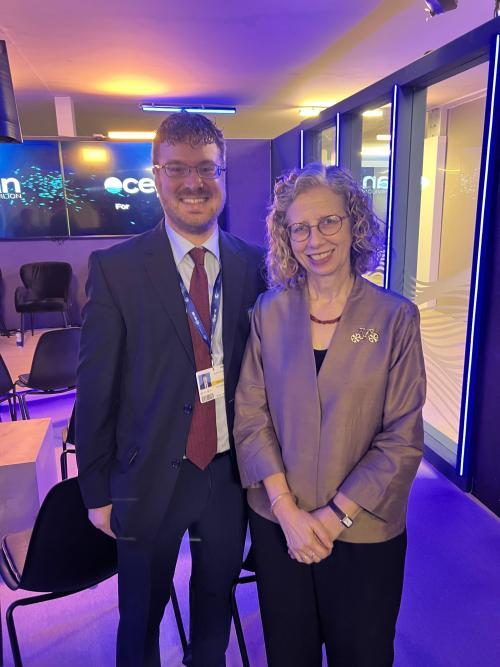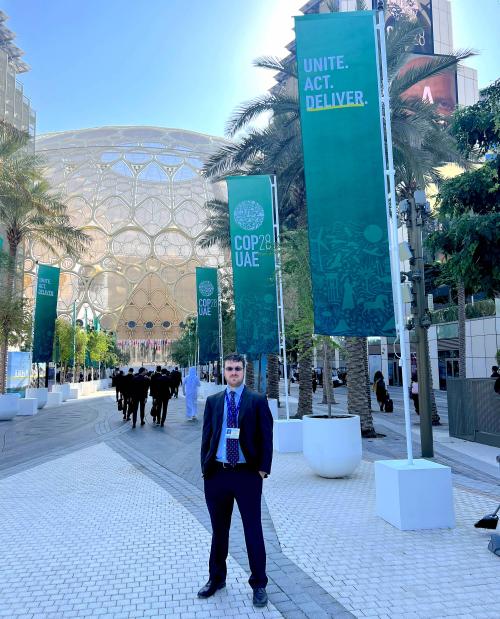
By Ian Hitchcock MPP'24
Overwhelming. Interesting. Deeply Ironic.

These are the words that first come to mind as I reflect on my experience at COP28 in Dubai. I came into this class with a healthy skepticism of the conflicts of interest inherent in having a petrostate like the UAE serve as the host of a climate conference in opulent spaces built off fossil fuel wealth. While nothing I experienced during my time in Dubai caused me to cast off my skepticism, I did come to see the convening of the COP as valuable. Ultimately, I found the COP process to be a necessary but not sufficient effort to address the myriad crises caused by our collapsing climate.
I chose to focus my time much more on the side events and pavilion convenings rather than closely following the negotiations. During my time in what has essentially become “Climate Coachella,” I met truly inspiring people, including global leaders I’ve long admired such as former Vice President Al Gore and the heads of the UN Environment Program, NRDC and EDF. I had conversations with incredible climate activists, dedicated nonprofit leaders and fellow students searching for their place to make a meaningful contribution to meeting the climate challenge. I attended fascinating panel discussions on topics as varied as infrastructure resilience, loss and damage funding mechanisms and citizen science. The fact that COPs regularly bring together earnest people seeking practical solutions is undeniably a good thing and was something that I was privileged to be a part of.

During my time at COP, I was struck by how often speakers emphasized the importance of public policy to incentivize the adoption of climate solutions. Over and over again I was told that the lack of a consistent policy framework was a major obstacle to implementing effective climate finance or rapidly deploying renewable energy. The clear need for pro-climate policies to steer the world away from fossil fuels and toward more equitable distribution of resources validated my decision to pursue graduate studies in public policy.
I think that the COP is most useful as a kind of forcing mechanism. The focused global attention that the COP creates on climate issues is a kind of gravitational pull that encourages governments, nonprofits and businesses to release reports, announce new climate actions and promise greater ambition. While many of these resources and commitments tend to vanish with little notice, some of the announcements do become actual initiatives that reduce emissions, create new funding streams for climate finance and shed light on the best paths forward.
But when it comes to the outcomes of the negotiations themselves, ostensibly the reason COP happens at all, I am far less certain. The fact that any text coming out of the negotiations must be agreed to by consensus means that the world is held hostage to the lowest common denominator of acceptable ambition. That is part of the reason why the burning of fossil fuels, a practice so obviously driving harmful pollution has not been called out in text at any of the 27 previous COPs. The question whether calls to phase out fossil fuels will make it into the final text remains to be seen.

While COP28 was filled with inspiring and alliterative slogans like “turning ambition into action,” I didn’t see many accountability mechanisms to move these pronouncements from rhetoric to reality. The gulf between voluntary pledges and climate progress is cavernous, and our situation gets increasingly dire the longer that we dawdle.
At the end of the day, what is COP for?
Ian Hitchcock is a second-year master’s student at the Sanford School of Public Policy, where he is studying energy and environmental policy. His passion for protecting wild places stems from his upbringing in rural Wyoming, and he has worked within government and nonprofit organizations to advance climate solutions and facilitate a just clean energy transition.